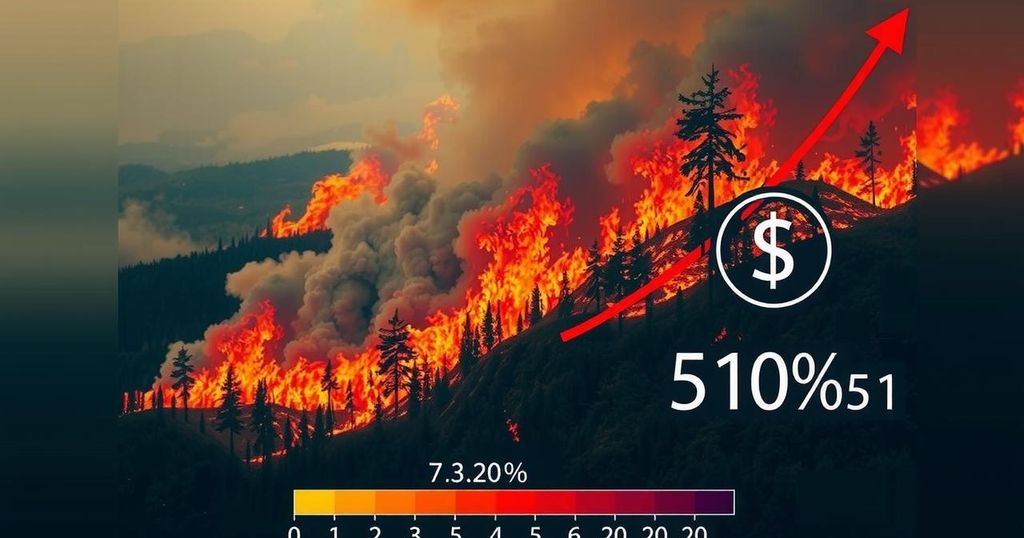Global Wildfire Increase Linked to Climate Change Amid Human Interventions

Recent studies by researchers from Dalhousie University, Belgium, the UK, and Japan have revealed a direct correlation between climate change and the escalating frequency and intensity of wildfires worldwide. The annual number of smoke-related deaths has surged from fewer than 669 in the 1960s to 12,566 in the 2010s. While human interventions have some impact, they are insufficient to counteract climate change effects, especially during extreme weather. Climate change contributes increasingly to global burned areas, and urgent action is needed to mitigate these trends.
Recent research has established a clear connection between climate change and the increasing rate and severity of wildfires globally. These studies highlight a significant rise in smoke-related fatalities attributed to wildfires over recent decades. Research teams from Dalhousie University, Belgium, the United Kingdom, and Japan published their findings in two separate papers, focusing on the correlation between wildfires and their impacts on human health, revealing deteriorating outcomes over time. It is estimated that the annual number of deaths due to wildfire smoke has surged from fewer than 669 in the 1960s to approximately 12,566 in the 2010s. One of the pivotal studies, which appeared in the journal Nature Climate Change, utilized models to compare wildfire occurrences with and without the influence of climate change. The results demonstrated an uptick in both the frequency and intensity of wildfires, particularly in sensitive ecosystems such as the African savannas, Australia, and Siberia. However, the research also indicated disparities across regions; Africa exhibited a notable reduction in wildfires—down to 70 percent of the global burnt area—primarily due to intensified human activity and land fragmentation, which inhibits fire spread. In contrast, areas such as California and Siberia experienced a rise in wildfire incidents, attributed to prolonged drought periods and elevated temperatures linked to climate change. Dr. Sian Kou-Giesbrecht, an associate professor at Dalhousie University and co-author of both studies, emphasized the significance of their work by stating, “The study is important because it shows and quantifies the influence of climate change on increasing wildfires worldwide, especially given the impacts of wildfire on society and its feedback to climate change.” Employing sophisticated models that account for various parameters such as climate, vegetation, and population density, the research team underscored that while human interventions, like fire suppression and landscape management, can mildly reduce the incidence and impact of wildfires, these measures are often insufficient to mitigate the robust effects of climate change, especially during extreme weather events. Seppe Lampe, a climate scientist at Vrije Universiteit Brussel, noted, “What is striking is that in periods with low to moderate numbers of fires, direct human interventions have a large effect. However, in periods with many fires, the effect of climate change dominates, meaning that in these cases we lose control.” The simulations indicated that climate change was responsible for a 16 percent increase in global burned area from 2003 to 2019 and elevated the likelihood of experiencing months characterized by above-average global burn rates by 22 percent. Furthermore, the contribution of climate change to the burned area is growing annually by 0.22 percent, with the most substantial rise documented in Central Australia. The authors of the paper concluded that urgent, comprehensive, and persistent reductions in greenhouse gas emissions, alongside effective land management strategies, are essential to stabilize the impacts of wildfires on human health and ecosystems. A concurrent study also published in the same journal revealed that climate change has amplified the proportion of deaths from wildfire smoke by tenfold over the previous fifty years, a development previously unquantified. This research, involving collaborators from the National Institute for Environmental Studies in Japan, applied advanced modeling techniques to establish a link between climate change and global human mortality from particulate matter emitted by wildfires. Their findings revealed that the percentage of fire-related deaths attributable to climate change rose from one to three percent in the 1960s to as much as 28 percent in the 2010s. The regions experiencing the highest mortality rates include South America, Australia, Europe, and the boreal forests of Asia. In summary, Dr. Kou-Giesbrecht pointed out the intricate nature of attributing wildfire occurrences to climate change due to the complex interplay between various factors affecting fire dynamics. If current trends in climate change persist, the area subjected to wildfires and the associated health impacts are expected to grow significantly in the future. Consequently, researchers advocate for immediate action and comprehensive strategies to combat climate change and mitigate its disastrous effects on wildfires and human health.
The topic of increasing wildfires and their relation to climate change has become a significant area of focus for researchers as the global climate crisis intensifies. The rise in temperatures and prolonged periods of drought, attributable to climate change, create ideal conditions for the occurrence of wildfires. Moreover, the interaction between human activities and natural environmental changes has further complicated the wildfire landscape. Understanding this relationship is critical for formulating effective responses to reduce both the incidence of wildfires and their impacts on public health and ecosystems.
In conclusion, the research unequivocally demonstrates that climate change is a driving force behind the rising incidence and severity of wildfires globally. The alarming increase in smoke-related fatalities showcases the dire public health implications of this environmental crisis. As the data indicate a growing trend in wildfire occurrences, it becomes imperative for policymakers and communities to implement robust climate action and land management strategies to safeguard human health and mitigate the ecological ramifications of wildfires.
Original Source: www.dal.ca






